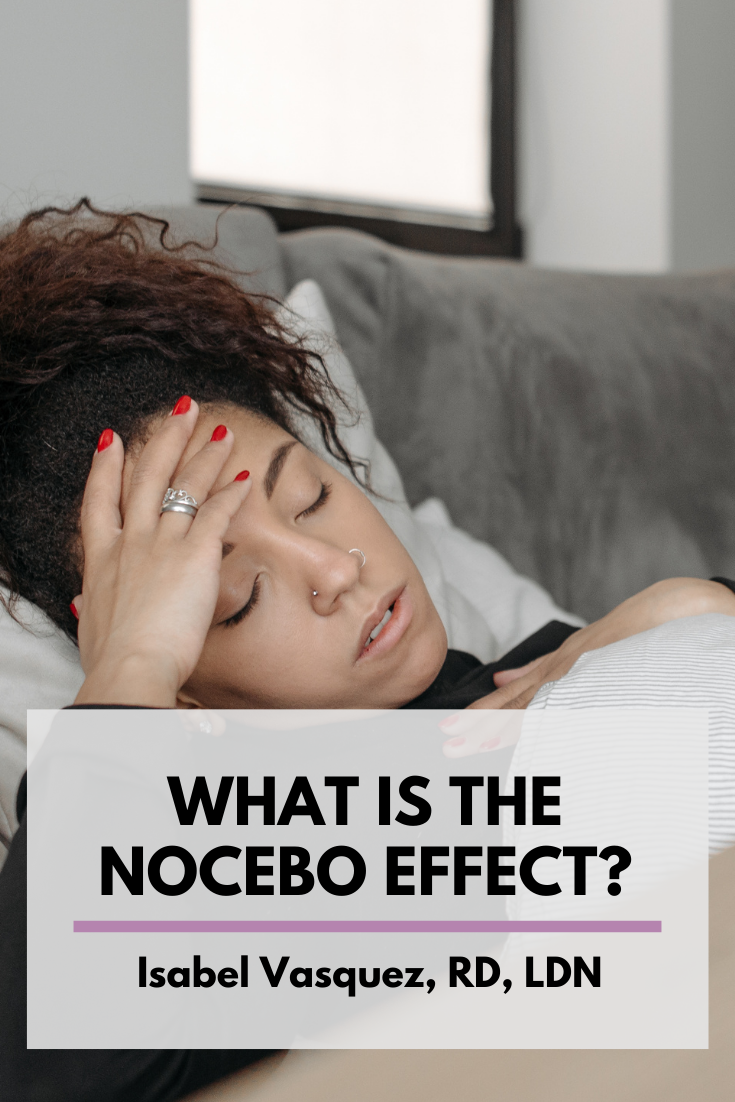What is the Nocebo Effect?
Written by Isabel Vasquez RD, LDN
You’ve probably heard of the placebo effect before—where you receive a fake medical treatment (e.g. a pill) but experience improvements in your symptoms—but have you ever heard of the nocebo effect?
It’s essentially the opposite of the placebo effect. It’s when you take something that’s not actually harmful, but your perception that it’s harmful causes you to have negative symptoms.
In this blog, learn more about what the nocebo effect is, how it comes into play with nutrition, and how you can address it.
What is the nocebo effect?
The nocebo effect is similar to the placebo effect except with a negative effect on symptoms instead of a positive one. It happens when you take something that may not be harmful in and of itself, but your perception that it’ll cause harm leads to a worsening of symptoms.
Studies, including a 2016 study in Pharmacology Research & Perspectives, have shown that the nocebo effect happens due to a combination of psychological and neurobiological mechanisms. So it’s a combination of the negative expectations and the resulting hormonal changes that lead to the worsening of symptoms we see.
For example, dairy has gotten a really bad rap by diet culture, so maybe you’ve come to believe when you eat dairy you’ll feel sick. Even if you aren’t lactose intolerant, you may feel gastrointestinal distress because of the nocebo effect.
How does the nocebo effect relate to nutrition?
The wellness world has caused many of us to blame food for our ailments. We think that if we change our diet we’ll “cure ourselves” even when our issues can’t be cured by what we eat or don’t eat.
We feel bad and automatically try figuring out what food might have caused it or what food we can eat to heal. With that in mind, we can see how the nocebo effect is at play for many of us.
Think about how often people attribute health concerns to things like dairy, gluten, or non-organic foods.
We must be mindful of this mind-body connection. Consider how by fearing these foods, you might actually be contributing to their negative impact even if you don’t have a true allergy or sensitivity to that food.
How can you minimize the nocebo effect in your life?
First off, examine your beliefs about food. If you have strong negative or positive beliefs about certain foods, get curious about why. What led you to develop those beliefs? This is helpful because if you have strong beliefs about certain foods’ health impacts, it might result in the nocebo or placebo effect.
Also, consider whether eating certain foods causes stress and anxiety (perhaps due to a disordered relationship with food), which could also result in physical symptoms, specifically gastrointestinal symptoms. In fact, studies have found that irritable bowel syndrome (IBS) is closely linked with stress thanks to the gut-brain connection.
Plus, there are lots of inaccurate allergy tests available online that make people believe they have a long list of food sensitivities or allergies that are simply not accurate. Seeing an allergist for an evidence-backed allergy test is recommended if you are truly concerned about food allergies.
Final Thoughts
The nocebo effect is the negative counterpart to the placebo effect. We see it lots of times with food thanks to diet culture inciting fear about certain foods.
If you think the nocebo effect may be impacting you, it’s worth understanding the true nutrition benefits of foods targeted by diet culture and working to reduce your judgment about different foods.
For education on how to ADD nutrition to your favorite Latine cultural dishes, make peace with food, and focus on your health without dieting, join our nutrition library for just $27/month.
If you liked this post, you may also like:
Why Do I Feel Guilty After Eating?

